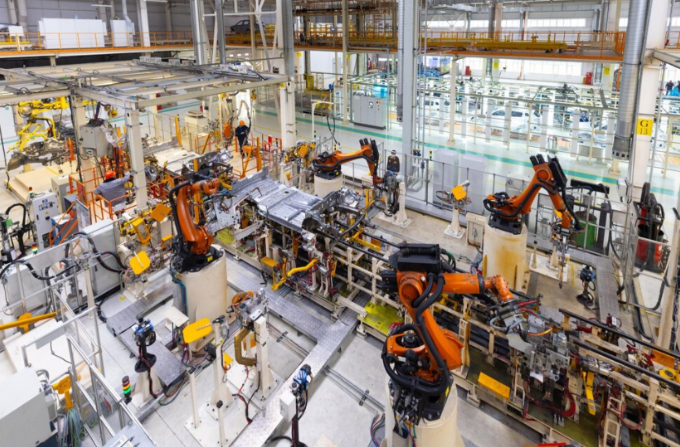In the manufacturing industry, staying ahead means optimizing every part of the operation.
That’s where NetSuite ERP comes in—a cloud-based system designed to streamline manufacturing processes, from production management to inventory control.
ERP systems are crucial in manufacturing because they integrate various functions, such as supply chain, production, and finance, into one unified platform.
This integration helps manufacturers gain real-time insights, reduce manual errors, and improve overall efficiency.
Implementing an ERP system like NetSuite can be challenging, but that’s where Cumula 3 Group (C3) steps in.
As an experienced NetSuite partner, C3 ensures a seamless implementation process, helping clients fully leverage NetSuite’s capabilities for success and growth in manufacturing.
In this article, we’ll explore how NetSuite ERP benefits the manufacturing sector, compare it with other ERP solutions, and consider the critical factors for successful implementation.
Looking to modernize your manufacturing operations? Contact Cumula 3 Group today and get custom pricing to see what’s possible.
ALSO READ:
→ Essential Features for Manufacturing ERP: Your Buying Checklist
→ NetSuite Implementation Expenses: A Comprehensive Buyer’s Manual
A Deep Dive into NetSuite ERP for Manufacturing
NetSuite ERP is a robust, cloud-based enterprise resource planning system that integrates all core business functions into one platform.
By providing a centralized system that combines everything from financial management to production control, NetSuite enables manufacturers to streamline their operations, improve efficiency, and make data-driven decisions in real-time.
Here are the features specifically designed for the manufacturing industry:
- Production Management: NetSuite’s production management tools allow manufacturers to plan, schedule, and control their production processes efficiently. This feature ensures that all stages of production—from raw materials to finished goods—are managed seamlessly, reducing delays and improving productivity.
- Inventory Control: Managing inventory is critical in manufacturing, and NetSuite excels in this area. It offers real-time visibility into inventory levels, supports multi-location inventory management, and optimizes stock levels to meet production needs while minimizing waste.
- Supply Chain Management: NetSuite enhances supply chain efficiency by integrating procurement, supplier management, and logistics into a single platform. This integration reduces lead times and ensures manufacturers can respond quickly to changes in demand or supply chain disruptions.
NetSuite’s manufacturing-specific features aim to address the complex challenges of modern manufacturing operations.
These features streamline day-to-day processes and empower businesses to make smarter, data-driven decisions that drive growth and profitability.
ALSO READ:
→ Understanding NetSuite: Your Complete Guide
→ Unlocking NetSuite’s Potential: Your Add-On Toolkit
5 Key Features of NetSuite for Manufacturing
Regarding manufacturing, efficiency, and precision are key to staying competitive in a fast-paced market.
NetSuite ERP offers powerful tools specifically designed to enhance every aspect of manufacturing operations.
Here are the core benefits of using NetSuite in manufacturing and how these advantages translate into tangible results:
1. Production Management
NetSuite’s production management feature enables manufacturers to plan, schedule, and execute production processes efficiently.
It offers real-time visibility into the entire production cycle, from the availability of raw materials to the completion of finished goods.
| Features | Description | Benefits |
| Production Planning | Helps in planning and scheduling production activities, ensuring that resources are efficiently allocated to meet production goals. | Ensures production targets are met, reduces downtime, and optimizes the use of resources. |
| Scheduling | Organizes production schedules, balancing workloads across machines and workstations to optimize productivity. | Improves on-time delivery rates by ensuring that production schedules are realistic and achievable. |
| Capacity Management | Monitors and manages production capacity to ensure that resources are adequately utilized. | Prevents production bottlenecks by ensuring that all resources are used effectively, reducing idle time. |
| Real-time Visibility | Provides up-to-the-minute insights into the entire production process, allowing for quick adjustments and decision-making. | Enhances the ability to respond to issues as they arise, minimizing disruptions and maintaining production schedules. |
| Workflow Management | Streamlines the flow of production tasks, coordinating between different departments and resources to maintain efficiency. | Improves overall efficiency by reducing bottlenecks and ensuring that each step of the production process is completed on time. |
| Work Order Management | Tracks and manages work orders from initiation to completion, ensuring that production tasks are executed according to plan. | Ensures that production runs smoothly by keeping track of each work in progress, reducing the risk of delays. |
This ensures that manufacturers can meet production targets while minimizing waste and reducing downtime.
2. Inventory Control
Managing inventory effectively is crucial in manufacturing, and NetSuite excels in this area.
The system provides advanced tools for tracking inventory levels, managing reorders, and optimizing stock across multiple locations.
| Features | Description | Benefits |
| Real-time Inventory Tracking | Provides up-to-date visibility of inventory levels across all locations, ensuring accurate stock information. | Reduces the risk of stockouts and overstocking by maintaining accurate inventory levels. |
| Reorder Management | Automates the process of reordering stock when inventory levels reach predefined thresholds, reducing the risk of stockouts. | Ensures timely replenishment of stock, preventing production delays and lost sales opportunities. |
| Multi-location Inventory | Manages inventory across multiple locations, ensuring that stock is optimally distributed and available where needed. | Optimizes stock levels across different locations, reducing the need for emergency transfers and improving availability. |
| Cycle Counting | Implements regular cycle counts to ensure inventory accuracy, reducing the need for full physical inventories. | Improves inventory accuracy, reducing discrepancies and the need for labor-intensive physical counts. |
| Lot and Serial Number Tracking | Tracks individual lots and serial numbers, allowing for precise inventory management and easy product traceability. | Enhances traceability and compliance, making managing recalls and quality control processes easier. |
With real-time data, manufacturers can maintain optimal inventory levels, avoid overstocking, and ensure that suitable materials are available when needed.
3. Supply Chain Management
NetSuite integrates all aspects of supply chain management, including procurement, logistics, and supplier relationships.
This feature helps manufacturers streamline supply chains, reduce lead times, and improve coordination between suppliers and production facilities.
| Features | Description | Benefits |
| Procurement Management | Streamlines the procurement process by automating purchasing, managing supplier contracts, and tracking orders. | Reduces procurement costs and improves order accuracy by automating and managing the purchasing process. |
| Logistics and Transportation | Optimizes the movement of goods by coordinating transportation, managing shipping schedules, and tracking deliveries. | It improves delivery times and reduces transportation costs through better coordination and tracking. |
| Supplier Relationship Management | Facilitates strong relationships with suppliers through performance tracking, communication management, and contract compliance. | Enhances supplier performance and ensures compliance, leading to more reliable and cost-effective supply chains. |
| Demand Planning | Forecasts demand accurately to ensure production and inventory levels align with market needs. | Aligns production and inventory with actual demand, reducing overproduction and stockouts. |
| Order Management | Handles the entire order lifecycle, from order entry to fulfillment, ensuring timely and accurate delivery of products. | Increases customer satisfaction by ensuring orders are fulfilled accurately and on time. |
The result is a more efficient supply chain that supports just-in-time manufacturing and reduces costs.
4. Shop Floor Control
NetSuite’s shop floor control feature provides real-time monitoring and control of shop floor activities.
It allows manufacturers to track the progress of work orders, monitor machine performance, and ensure that production processes are running smoothly.
| Features | Description | Benefits |
| Work Order Tracking | Tracks the progress of work orders through each production stage, ensuring that tasks are completed on time. | Improves on-time delivery rates by ensuring that production tasks get completed on time. |
| Machine Performance Monitoring | Monitors the performance of machines on the shop floor, helping to identify and address issues before they lead to downtime. | Reduces machine downtime and maintenance costs by identifying performance issues early. |
| Labor Management | Manages labor resources effectively by tracking employee hours, assignments, and productivity. | Optimizes workforce productivity and reduces labor costs through efficient management. |
| Real-time Production Monitoring | Provides real-time visibility into the production process, allowing managers to make quick adjustments as needed. | Enhances production efficiency by enabling real-time decision-making and quick responses to issues. |
| Quality Control | Ensures that products meet quality standards through continuous monitoring and testing during production. | Maintains high product quality, reducing the risk of defects and increasing customer satisfaction. |
This visibility helps identify and address issues quickly, improving productivity and reducing downtime.
5. Financial Management
Integrating financial management with manufacturing operations is essential for maintaining profitability.
NetSuite offers a comprehensive financial management module with budgeting, forecasting, and cost control features.
| Features | Description | Benefits |
| Budgeting and Forecasting | Helps businesses plan their financial future by creating budgets and forecasts based on real-time data. | Enables informed decision-making by providing accurate financial forecasts and budgets. |
| Cost Management | Monitors and controls costs across the organization, ensuring that expenses are managed effectively. | Reduces unnecessary expenses and improves profitability through effective cost control. |
| Financial Reporting | Generates comprehensive financial reports, providing insights into the company’s financial health. | Provides clear visibility into financial performance, aiding in strategic planning and decision-making. |
| Accounts Payable and Receivable | Manages the flow of money in and out of the business by overseeing invoices, payments, and collections. | Improves cash flow management and reduces the risk of payment delays or missed collections. |
| Revenue Recognition | Ensures accurate revenue recognition in compliance with accounting standards, improving financial transparency. | Enhances financial compliance and accuracy, reducing the risk of errors in revenue reporting. |
By linking financial data with production and inventory information, manufacturers can clearly view their financial performance and make informed decisions to enhance profitability.
NetSuite empowers manufacturing businesses to operate more efficiently, reduce costs, and drive growth.
These five key features illustrate how NetSuite can transform your manufacturing operations, making it easier to stay competitive.
As you look to enhance your manufacturing processes, consider how these tools can help you achieve your business goals with greater precision and confidence.
ALSO READ:
→ Why Skipping Warehouse Software Costs You Big Time
→ Best NetSuite Implementation Partners
Comparing NetSuite with Other Manufacturing ERP Solutions
Several key ERP solutions, including SAP and Microsoft Dynamics 365, are often compared to NetSuite in the manufacturing industry.
While these systems offer robust features, NetSuite’s cloud-native design and industry-specific focus provide a unique advantage in scalability and customization.
Let’s compare NetSuite with other Manufacturing ERP Solutions:
| Feature | NetSuite | SAP | Microsoft Dynamics 365 |
| Production Management | Integrated real-time visibility and control across production processes. | Comprehensive production management but requires complex setup. | Solid production management with good integration options. |
| Supply Chain Integration | Seamless integration across procurement, logistics, and supplier management. | Strong integration but often involves high customization costs. | Good integration with Microsoft’s ecosystem but may require additional modules. |
| Inventory Control | Advanced real-time tracking, multi-location management, and automated reorder processes. | Robust inventory control but can be difficult to manage across multiple locations. | Effective inventory control with good tracking capabilities. |
| Scalability | A highly scalable cloud-based platform that grows with the business. | Scalable but requires significant infrastructure investment. | It is scalable with Microsoft’s cloud solutions but can become complex. |
| Customization | Extensive customization options to fit specific manufacturing needs. | Highly customizable but often requires extensive development resources. | Customizable but may need third-party applications for specific needs. |
| Ease of Use | User-friendly interface with minimal IT support required. | Powerful but has a steep learning curve. | It is integrated with other Microsoft tools and is relatively easy to use. |
NetSuite’s ability to scale, customize, and integrate seamlessly across all aspects of manufacturing operations makes it an ideal choice for businesses looking to optimize efficiency and drive growth.
As you evaluate your options, consider how NetSuite’s tailored approach can provide the flexibility and support your manufacturing operations need to thrive in a competitive market.
ALSO READ:
→ NetSuite Substitutes: Examining 15 Competing ERP Solutions
→ Tips for Your NetSuite Setup
Key Factors for Successful NetSuite Implementation
A successful deployment requires considering various factors, from understanding your business needs to ensuring smooth integration with existing systems.
In this section, we’ll explore key implementation considerations that will help you maximize the benefits of NetSuite ERP:
- Assessing Business Needs and Setting Goals: Before implementing NetSuite ERP, it’s crucial to thoroughly evaluate your business needs and set clear, measurable goals. This process involves understanding the specific challenges and inefficiencies the ERP system will address in your manufacturing operations. Clear objectives will guide the implementation process, ensuring that the system is tailored to meet your unique requirements and delivers the expected outcomes.
- Involving Key Stakeholders Early: Engaging key stakeholders from the beginning is vital to the success of the implementation. These stakeholders, including managers, IT staff, and end-users, provide valuable insights and help identify potential issues before they become problems. Early involvement also ensures buy-in across the organization, facilitating smoother adoption and reducing resistance to change.
- Customization and Configuration: Customization is critical in aligning NetSuite with your specific manufacturing processes. This includes configuring workflows, reports, and integrations to match your operational needs. Proper customization ensures that the ERP system enhances efficiency and supports your business goals, rather than forcing your processes to fit a generic template.
- Integration with Existing Systems: For many manufacturers, integrating NetSuite with existing legacy systems or third-party applications is essential. This integration maintains continuity in operations and ensures that data flows seamlessly between systems. Careful planning and testing during the integration phase can prevent disruptions and ensure that all systems work together effectively.
- Comprehensive Training and Ongoing Support: Effective training ensures your team can fully leverage NetSuite’s capabilities. Extensive training programs should be tailored to different user roles, ensuring that everyone understands how to use the system efficiently. Additionally, ongoing support is necessary to address any issues that arise after implementation and to take advantage of new features as they are released, ensuring long-term success with the ERP system.
Successfully implementing NetSuite ERP in your manufacturing operations involves more than just installing software—it requires a strategic approach that considers your unique needs and challenges.
With careful planning, customization, and comprehensive training, your ERP system can become a powerful tool for driving efficiency and growth.
At Cumula 3, our team of experts is dedicated to ensuring a smooth implementation process so you can fully leverage NetSuite’s capabilities and achieve lasting success in your manufacturing operations.
ALSO READ:
→ Accounting Today Features Cumula 3 Group in VAR 100 List for 2023
→ Streamlining Your Finances: A Practical NetSuite Account Reconciliation Guide
Conclusion – NetSuite for Manufacturing
NetSuite ERP offers a comprehensive solution tailored to the unique demands of the manufacturing industry.
Its robust features, including production management, inventory control, and supply chain integration, provide manufacturers with the tools they need to optimize operations and drive growth.
Compared to other ERP solutions, NetSuite’s cloud-native design and industry-specific focus set it apart as a market leader.
However, successful implementation requires careful planning, customization, and ongoing support.
Cumula 3 can help you transition smoothly and fully utilize NetSuite’s capabilities by providing expertise and guidance.
By partnering with Cumula 3, manufacturers can confidently navigate the complexities of ERP implementation and unlock the full potential of their operations.
With the right approach, NetSuite can become a key driver of efficiency, innovation, and long-term success in the manufacturing sector.
Want to give your manufacturing business an edge? Start by exploring your NetSuite pricing estimate with Cumula 3 Group.







